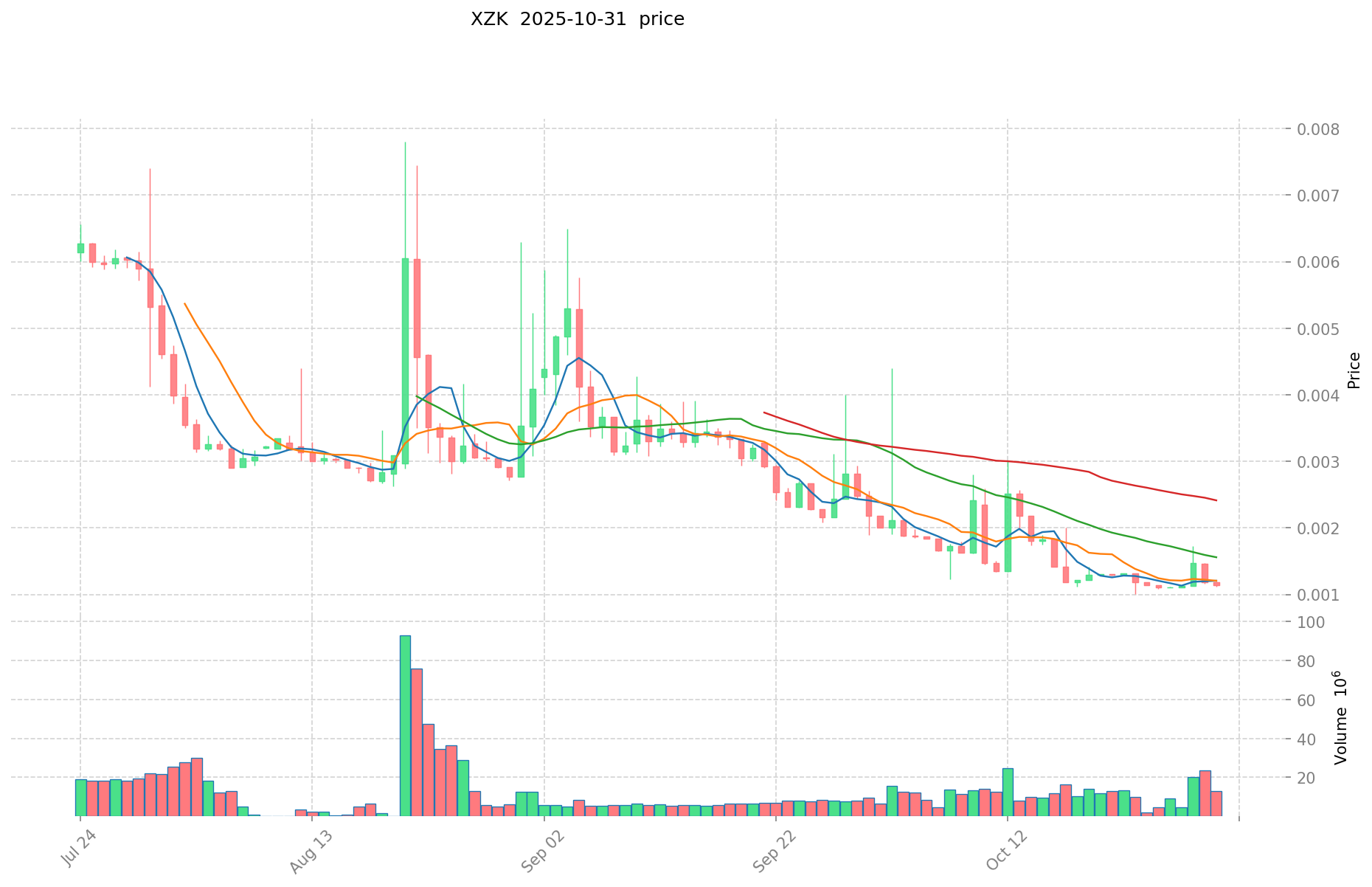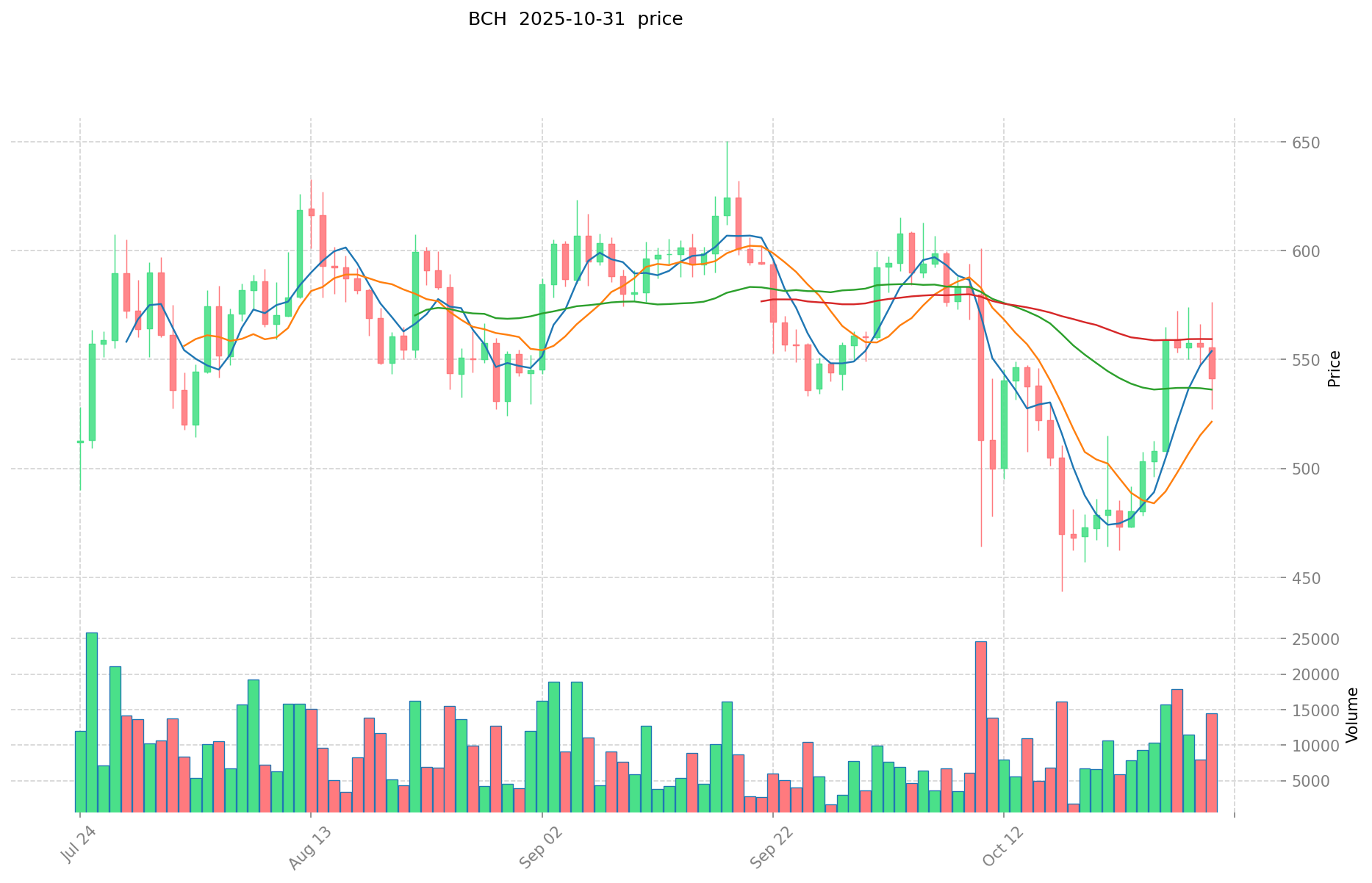XZK vs BCH: The Battle for Crypto Supremacy in Emerging Markets
Introduction: XZK vs BCH Investment Comparison
In the cryptocurrency market, the comparison between Expand (XZK) and Bitcoin Cash (BCH) has been an unavoidable topic for investors. The two not only differ significantly in market cap ranking, application scenarios, and price performance, but also represent different positioning in the crypto asset space.
Expand (XZK): Launched in 2024, it has gained market recognition for its role as a universal ZK SDK enhancing blockchain scalability, interoperability, and security.
Bitcoin Cash (BCH): Introduced in 2017, it has been hailed as a continuation of Satoshi's vision for global adoption, and is one of the cryptocurrencies with the highest global trading volume and market capitalization.
This article will provide a comprehensive analysis of the investment value comparison between XZK and BCH, focusing on historical price trends, supply mechanisms, institutional adoption, technological ecosystems, and future predictions, attempting to answer the question most concerning to investors:
"Which is the better buy right now?" I. Price History Comparison and Current Market Status
XZK (Coin A) and BCH (Coin B) Historical Price Trends
- 2024: XZK launched and reached its all-time high of $0.42399.
- 2017: BCH was created through a Bitcoin hard fork, with its price peaking at $4,300.04 in December.
- Comparative analysis: In the recent market cycle, XZK dropped from its high of $0.42399 to a low of $0.001001, while BCH declined from its all-time high of $3,785.82 to a current price of $553.72.
Current Market Situation (2025-10-31)
- XZK current price: $0.001128
- BCH current price: $553.72
- 24-hour trading volume: XZK $10,249.74 vs BCH $8,637,399.55
- Market Sentiment Index (Fear & Greed Index): 29 (Fear)
Click to view real-time prices:
- View XZK current price Market Price
- View BCH current price Market Price


Investment Value Analysis: XZK vs BCH Core Factors
I. Core Factors Influencing XZK and BCH Investment Value
Supply Mechanisms Comparison (Tokenomics)
- BCH: Follows Bitcoin's halving mechanism with a maximum supply of 21 million coins
- 📌 Historical pattern: The supply mechanism influences price cycles, with BCH experiencing volatility following its fork from Bitcoin in 2017
Institutional Adoption and Market Applications
- Enterprise adoption: BCH shows potential as "electronic cash" for small daily payments due to its larger block size and lower transaction fees
- Regulatory attitudes: Regulatory environment changes significantly impact both cryptocurrencies' valuation and adoption
Technical Development and Ecosystem Building
- BCH technical development: Block size expanded from 1MB to 8MB and further to 32MB, enabling faster transaction processing
- BCH ecosystem: Implementation of smart contract functionality in 2021 expanded its capabilities beyond payments
- Ecosystem comparison: BCH faces competition from Ethereum's smart contract ecosystem and other low-fee cryptocurrencies like Litecoin
Macroeconomic Factors and Market Cycles
- Inflation environment performance: Digital assets including BCH gained attention during economic uncertainty (e.g., COVID-19 pandemic)
- Macroeconomic policy influence: Global economic uncertainty, policy regulations, and market sentiment significantly impact cryptocurrency prices
- Geopolitical factors: Cross-border transaction demands affect adoption rates and valuation
III. 2025-2030 Price Prediction: XZK vs BCH
Short-term Prediction (2025)
- XZK: Conservative $0.00086548 - $0.001124 | Optimistic $0.001124 - $0.00116896
- BCH: Conservative $531.6288 - $553.78 | Optimistic $553.78 - $786.3676
Mid-term Prediction (2027)
- XZK may enter a growth phase, with estimated price range $0.00077129442 - $0.00142392816
- BCH may enter a bullish market, with estimated price range $491.59964337 - $1078.58429217
- Key drivers: Institutional capital inflow, ETF, ecosystem development
Long-term Prediction (2030)
- XZK: Base scenario $0.001683272942208 - $0.00227241847198 | Optimistic scenario $0.00227241847198+
- BCH: Base scenario $1146.765035469607125 - $1467.85924540109712 | Optimistic scenario $1467.85924540109712+
Disclaimer: The above predictions are based on historical data and market analysis. Cryptocurrency markets are highly volatile and unpredictable. This information should not be considered as financial advice. Always conduct your own research before making investment decisions.
XZK:
| 年份 | 预测最高价 | 预测平均价格 | 预测最低价 | 涨跌幅 |
|---|---|---|---|---|
| 2025 | 0.00116896 | 0.001124 | 0.00086548 | 0 |
| 2026 | 0.0012267336 | 0.00114648 | 0.0007222824 | 1 |
| 2027 | 0.00142392816 | 0.0011866068 | 0.00077129442 | 5 |
| 2028 | 0.0014096888784 | 0.00130526748 | 0.0009528452604 | 15 |
| 2029 | 0.002009067705216 | 0.0013574781792 | 0.00095023472544 | 20 |
| 2030 | 0.00227241847198 | 0.001683272942208 | 0.000908967388792 | 49 |
BCH:
| 年份 | 预测最高价 | 预测平均价格 | 预测最低价 | 涨跌幅 |
|---|---|---|---|---|
| 2025 | 786.3676 | 553.78 | 531.6288 | 0 |
| 2026 | 797.387822 | 670.0738 | 408.745018 | 21 |
| 2027 | 1078.58429217 | 733.730811 | 491.59964337 | 32 |
| 2028 | 1114.57378844955 | 906.157551585 | 625.24871059365 | 63 |
| 2029 | 1283.16440092193925 | 1010.365670017275 | 575.90843190984675 | 82 |
| 2030 | 1467.85924540109712 | 1146.765035469607125 | 733.92962270054856 | 107 |
IV. Investment Strategy Comparison: XZK vs BCH
Long-term vs Short-term Investment Strategies
- XZK: Suitable for investors focusing on ecosystem potential and ZK technology advancements
- BCH: Suitable for investors seeking established networks and potential as a digital payment system
Risk Management and Asset Allocation
- Conservative investors: XZK: 5% vs BCH: 15%
- Aggressive investors: XZK: 15% vs BCH: 25%
- Hedging tools: Stablecoin allocation, options, cross-currency combinations
V. Potential Risk Comparison
Market Risks
- XZK: Higher volatility due to lower market cap and trading volume
- BCH: Susceptible to broader cryptocurrency market trends and Bitcoin price movements
Technical Risks
- XZK: Scalability, network stability
- BCH: Mining centralization, potential security vulnerabilities
Regulatory Risks
- Global regulatory policies may have differing impacts on both assets
VI. Conclusion: Which Is the Better Buy?
📌 Investment Value Summary:
- XZK advantages: Potential for growth in ZK technology ecosystem, lower entry point
- BCH advantages: Established network, higher liquidity, potential as digital cash
✅ Investment Advice:
- New investors: Consider a small allocation to BCH for exposure to established cryptocurrencies
- Experienced investors: Balanced approach with both XZK and BCH based on risk tolerance
- Institutional investors: Evaluate BCH for its liquidity and XZK for its technological potential
⚠️ Risk Warning: The cryptocurrency market is highly volatile. This article does not constitute investment advice. None
VII. FAQ
Q1: What are the main differences between XZK and BCH? A: XZK is a newer cryptocurrency launched in 2024, focusing on ZK technology for blockchain scalability and interoperability. BCH, launched in 2017, is a fork of Bitcoin aimed at improving transaction speed and reducing fees for everyday use as digital cash.
Q2: Which cryptocurrency has shown better price performance recently? A: Based on the provided data, BCH has shown better price stability and higher trading volume. As of October 31, 2025, BCH is trading at $553.72, while XZK is at $0.001128.
Q3: What are the key factors influencing the investment value of XZK and BCH? A: Key factors include supply mechanisms, institutional adoption, technical development, ecosystem building, macroeconomic factors, and market cycles. BCH benefits from its established network and potential as digital cash, while XZK's value is tied to advancements in ZK technology.
Q4: How do the long-term price predictions for XZK and BCH compare? A: For 2030, XZK's base scenario price range is predicted to be $0.001683272942208 - $0.00227241847198, while BCH's base scenario range is $1146.765035469607125 - $1467.85924540109712. BCH is projected to have a higher percentage increase.
Q5: What are the recommended investment strategies for XZK and BCH? A: For conservative investors, a suggested allocation is 5% XZK and 15% BCH. For aggressive investors, 15% XZK and 25% BCH. New investors might consider starting with a small allocation to BCH, while experienced investors could balance both assets based on risk tolerance.
Q6: What are the main risks associated with investing in XZK and BCH? A: Both face market risks, technical risks, and regulatory risks. XZK may have higher volatility due to its lower market cap and trading volume. BCH is susceptible to broader cryptocurrency market trends and Bitcoin price movements. Both are subject to evolving global regulatory policies.
Q7: Which cryptocurrency might be better for long-term investment? A: The choice depends on individual investment goals and risk tolerance. BCH offers an established network and higher liquidity, making it potentially more suitable for those seeking stability. XZK may appeal to investors interested in emerging technologies and willing to accept higher risk for potential growth in the ZK technology ecosystem.
Share
Content